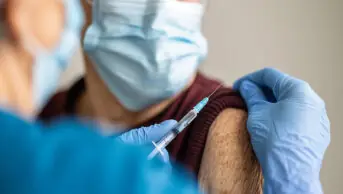
Shutterstock.com
The UK would struggle to scale up its emergency response to an antimicrobial-resistant infection epidemic, a report by the House of Commons Public Accounts Committee (PAC) has warned.
In the report, published on 13 June 2025, officials from the Department of Health and Social Care (DHSC) told the PAC that while there is some resilience against the ongoing chronic threat of antimicrobial resistance (AMR), an acute risk would be “more challenging” to deal with.
The report also found that progress related to the use of diagnostic tools to support the prescribing of antibiotics has “fallen short of what is needed”.
Inappropriate prescribing of antibiotics in primary care remains “too high”, with an estimated 20% of antibiotic prescriptions being unnecessary, the PAC report said.
It follows a National Audit Office report, published in February 2025, which found that the government had missed several of its own targets on AMR, including cutting antibiotic use through greater use of diagnostic tests.
In the PAC report, MPs called on the DHSC, NHS England and the UK Health Security Agency to set out how they intend to make “demonstrable progress in the use of diagnostic tools”, including under the Pharmacy First scheme, over the next two years.
The report referred to research, published in March 2025, suggesting that patients with a sore throat are twice as likely to be given antibiotics by a pharmacist in England than they are in Wales, which might relate to the use of diagnostic tests for patients in Wales.
However, according to the report, NHS England told the PAC inquiry that early data from Pharmacy First had not shown any increase in antibiotic prescribing.
NHS England also told MPs that there would be “an explosion” of point-of-care diagnostic tests once the evidence for their use was in place, the report said.
It also revealed that experts told the PAC that there is an increasing threat from more resistant strains of pathogens, which cause Gram-negative infections and are more likely to result in the death of the patient.
This shift will cause “great difficulties for the NHS”, given that there are even fewer treatment options, MPs heard.
The poor condition of the NHS estate also hinders infection control measures with rising rates of MRSA and Clostridioides difficile acquired in hospitals, the report said.
The report concluded that the government does deserve credit for the UK being one of the first countries to introduce an antibiotic subscription model.
Work is now needed to evaluate its impact on the use of antibiotics as well as pharmaceutical companies’ efforts to bring new antibiotics to the market, the report said.
The report added that the first round of contracts under the model is expected to cost £1.9bn over 16 years.
However, with the UK accounting for only 3% of the global market for antibiotics and pharmaceutical companies, other countries also need to be encouraged to adopt similar approaches, it added.
In the report, the PAC also warned that globally, progress in tackling the threat of AMR could also be affected by trade deals and aid cuts.
Geoffrey Clifton-Brown, chair of the PAC and Conservative MP for North Cotswolds, said: “It was particularly unwelcome to hear in the course of our inquiry that, as with the COVID-19 pandemic, the UK would be well-placed scientifically to understand an acute AMR emergency, but would face challenges in mustering efforts to respond to it.
“The NHS needs to put slowing the spread of AMR right at the core of its work.”
“Our report makes clear that all medical professionals — doctors, vets and pharmacists — need to be using the very best diagnostic tools to ensure antibiotics are only prescribed where necessary and that the correct antibiotic is prescribed when required,” he added.
Commenting on the report, Diane Ashiru-Oredope, deputy chief scientist for the Royal Pharmaceutical Society (RPS), said: “The call for demonstrable progress in the use of diagnostic tools, where appropriate, aligns with the RPS’s vision for pharmacy professional practice, which sets out how pharmacy teams can support better patient care and address key challenges facing the nation’s health.
“The vision also emphasises the importance of delivering consistent, patient-focused services through community pharmacy that enhance access to care.”
A spokesperson for the DHSC said: “AMR is a serious global threat — our AMR national action plan outlines how we are urgently tackling its spread, both in the UK and overseas.
“We have made important progress, including reducing antibiotic use in meat and pioneering a world-first subscription model to incentivise the development of new treatments.”
“We are working closely with international partners, including during trade discussions, to mobilise global efforts to limit the spread of AMR,” they added.


